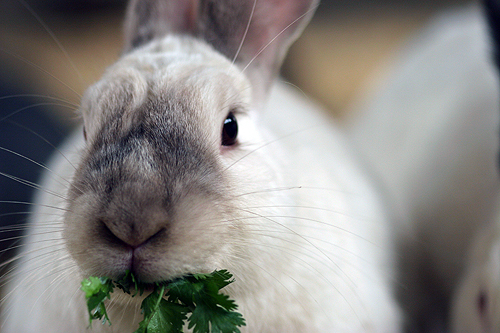 There is no doubt that rabbits are adorable and cute. With their twitchy noses and soft fur, they can inspire even the most stoic to smile.
There is no doubt that rabbits are adorable and cute. With their twitchy noses and soft fur, they can inspire even the most stoic to smile.With the right amount of care and attention, they make wonderful companions. A rabbit is an 8-12 year commitment and, more often than not, the rabbit is going to prefer a more hands-off approach. Rabbits are a prey species and few really enjoy the predator-like behavior of being picked up and hugged. It is for this reason (among others) that rabbits should never be adopted solely as a companion animal for the youngest member of the human family. Adopting and caring for a rabbit is the sole responsibility of the adult members of the family who must also establish ground rules for how everyone will interact with the rabbit. An understanding must be made that the rabbit may never like being pet or picked up, and that that is okay. We respect the feelings of humans who don't want to be hugged, there is no reason not to respect the feelings of rabbits who don't want to be picked up.
If you are considering buying a rabbit this time of year, my first response is don't. Think long and hard about the time, cost and effort a companion rabbit will require, not to mention the space and "rabbit-proofing" your home will have to undergo to provide a safe environment for a curious bunny. Cages should never be used as the sole method of confinement, but only as a safe place for the rabbit to sleep or use when unsupervised.
Instead of a rabbit, here are some animal friendly Easter-alternatives:
1) Stuffed animals: Kids love 'em, they're cheaper than a living animal, and they will happily endure the antics of an overzealous child.
2) Chocolate bunnies, preferably vegan, are always a kid-friendly alternative.
3) Sponsor a rabbit at your local rabbit rescue, humane society or shelter.
If you are really interested in a bunny, here are some suggestions:
1) Research by reading through websites and books. Talk to your local shelter, rabbit rescue or humane society about the pros and cons of adopting a rabbit.
2) Adopt, do not buy.
2) Consider fostering a rabbit through your local rabbit rescue or humane society. This will give you an idea of the commitment caring for a rabbit requires.
3) A house rabbit needs space. You will have to rabbit proof your house, much like you would for a toddler or crawling infant. Be prepared to open up a portion of your house and, hopefully, backyard for your rabbit's exercise needs.
4) Remember rabbits are prey animals and may be afraid of your predatory companions, dogs and cats. They may even inspire some unwanted (though natural) behaviors from your dogs or cats. All the animals should have safe areas of the house/yard where they will not interact.
5) Contact veterinarians throughout the area to make sure one is available to care for a rabbit.
Rabbits are smart, social critters who make wonderful companions in homes that respect their individuality and special needs. But please do your homework before welcoming a rabbit into your home.






1 comments:
Thank you!! This is so true, I work with Rabbits in Oakland and every day people come in wanting a cute bunny for their kids. Only when I explain to them that rabbits are not a good "starter pet" and that they require as much work as cats and dogs do they start to think about rabbits as pets in the right way. People soon realize that in order to care for a rabbit in the right way and have it live a health long life they will have to spay & neuter, go to the vet regularly, give it Timothy hay, leafy greens daily, change the litterbox every other day, keep it in the living room and give it free run of the house for at least four hours a day.
That is usually when people start talking to their kids about getting a goldfish or houseplant.
Post a Comment